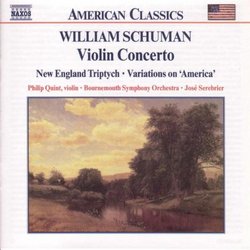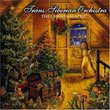| All Artists: José Serebrier Title: William Schuman: Violin Concerto Members Wishing: 1 Total Copies: 0 Label: Naxos American Release Date: 5/15/2001 Genre: Classical Styles: Forms & Genres, Concertos, Historical Periods, Modern, 20th, & 21st Century, Instruments, Strings, Symphonies Number of Discs: 1 SwapaCD Credits: 1 UPC: 636943908327 |
Search - José Serebrier :: William Schuman: Violin Concerto
 | José Serebrier William Schuman: Violin Concerto Genre: Classical
Although Schuman wrote his Violin Concerto in the 1950s, it seems very much at home in today's world. Loud, abrasive, aggressive, it is punctuated by deafening crashes; the opening sets the stage with a solo that leaps bac... more » |
Larger Image |
CD DetailsSynopsis
Amazon.com Although Schuman wrote his Violin Concerto in the 1950s, it seems very much at home in today's world. Loud, abrasive, aggressive, it is punctuated by deafening crashes; the opening sets the stage with a solo that leaps back and forth with dizzying speed and momentum. The violinist seems to spend a lot of time competing with the percussion, but the second theme is poetic and tender, giving the violin a chance to do what it does best: sing. It also gets to converse with the orchestral soloists; indeed, the orchestra is an equal partner rather than an accompanying group. The second of the two movements, oddly titled "Introduzione," includes a rhythmically pungent, witty, charming Scherzo, and a long orchestral fugue, as well as more singing sections and more bangs and crashes. The solo part is fiendishly difficult, with runs at top speed, stratospheric passages, double and triple stops, and one long and one short cadenza. In addition, it is full of instantaneous changes of mood and character, demanding utmost control of tone, nuance, inflection, and expression. Philip Quint negotiates all these technical and musical hurdles with easy virtuosity, aplomb, poise, and stylistic empathy. His tone soars rapturously in the lyrical parts, his playing is forceful but never rough. The two pieces of Americana show Schuman in a different, gentle, intimate light, though the first of the Triptych also abounds with brass and percussion. Ives's Variations, masterfully orchestrated, are a grand joke, poking fun at every imaginable dance form and even including his trademark polytonal imitation of two bands playing simultaneously. These "American Classics," interestingly, are performed entirely by non-American players: a Russian-born violinist, an English orchestra, and a conductor of Polish-Uruguayan descent. Music is indeed a universal language. --Edith Eisler Similarly Requested CDs
|
CD ReviewsIf I weren't normally so straight-laced, I'd say "Boffo!" Bob Zeidler | Charlton, MA United States | 08/10/2001 (5 out of 5 stars) "This latest release in the Naxos "American Classics" series solves two problems for me, gets me to retire a CD that has well earned its retirement, and throws up a fresh challenge. One problem solved is a lengthy search I had been making for the CD transfer of a 30-year-old LP, by Paul Zukofsky with Michael Tilson Thomas and the Boston Symphony, of the premiere recording of the "final" version of Schuman's Violin Concerto. While I had at least one stop-gap CD (Robert McDuffie, with Leonard Slatkin and the St. Louis Symphony Orchestra) to tide me over, that performance never seemed to have the same visceral excitement that Zukofsky's did. This new Naxos performance, featuring Philip Quint (my first hearing of Mr. Quint) not only puts into retirement the McDuffie/Slatkin recording; it also exceeds the Zukofsky/Tilson Thomas recording by a comfortable margin. Quint is fully the technical and lyrical equal of Zukofsky. More importantly, the performance of the Bournemouth Symphony Orchestra under the direction of José Serebrier is stunningly virtuosic, and the whole is captured in equally stunning sound. The extended timpani solo that opens the second movement, to mention just one performance highlight beyond the solo work of Mr. Quint, is a bravura performance and the sound quality is of a level that would do any high-end audiophile label proud. Another problem solved is a similar search for a CD transfer of an elderly LP, this one a recording of Ives's "Variations on `America'" as orchestrated by Schuman, with Morton Gould and the Chicago Symphony Orchestra. (This, when it was intially released, had been coupled with the world premiere recording of Ives's First Symphony and "The Unanswered Question." A CD transfer of the First Symphony had an entirely different coupling.) These variations - whether in the original organ version (which Ives's father forbade him to play in church, lest "the boys giggle") or in this famous Schuman orchestration - are a lot of fun for most Americans. Since the tune is also "God Save The Queen," one hopes that the Bournemouth musicians got an equal level of enjoyment out of the performance. The recording certainly suggests that they did. The CD that truly gets retired with this Naxos acquisition is the Howard Hanson/Eastman-Rochester Symphony Orchestra recording of Schuman's "New England Triptych." Despite its age (1963), it has held up exceedingly well, and was always one of the very best of the Mercury Living Presence CD transfers. But this new Naxos performance is the hands-down winner on all counts: orchestral precision, ability to follow inner voices with ease, sublime string playing in the "When Jesus Wept" movement, the best percussion work I've ever heard in the concluding "Chester" movement, and of course sonics. To this Bill Schuman aficianado, these three works - when taken with his masterpiece, his Third Symphony - serve well to sample his abilities as a composer. (Well, the Ives orchestration may be considered "Schuman Lite," but it's certainly fun.) Each of these Naxos takes is at the top of its class, in my not-so-humble opinion. To get all three together, at this price, can best be described as a "ka-ching!" (the sound of a cash register, if you've never seen the expression before). This is not the first time that I've commented on the work of Serebrier at these Amazon.com pages. An earlier review of his Reference Recordings CD of Rimsky-Korsakov's "Sheherazade" and "Great Russian Easter Overture," with the London Philharmonic Orchestra, garnered equally high praise (but coming at a considerably higher price than this Naxos CD, of course). What Serebrier seems to bring to these quite disparate sets of works, orchestras and labels is an attention to detail, a precision of orchestral performance, and a balance of all choirs and instruments in the orchestras that is significantly above the norm. I sense that part of his conductorial "toolkit" is his skill in getting the musicians to truly listen to each other as they play; failing this, I'd be at a loss to explain the results he obtains. Admittedly, this is a small sample on which to base an opinion, much less a conclusion, but it is my opinion that Maestro Serebrier is a "sleeper" amidst the current flock of publicist-driven music directors. Which gets me, finally, to the challenge: Will this new Naxos disc survive my "test-to-destruction" efforts that some recently memorable Naxos discs have? I think it will. Bob Zeidler" Schuman at His Best and Most Schumanesque David A. Kemp | 05/15/2002 (4 out of 5 stars) "I wish I could wax as enthusiastic about the Violin Concerto as other reviewers have done. As Serebrier says in his sympathetic liner notes, the concerto has all the drama--I'd say histrionics--of Schuman's symphonies, a drama that for me is much ado about--little. Though Schuman is clearly a fine craftsman and a great orchestrator, I can't buy into the rhetorical seriousness of much of his orchestral music. One problem is certainly that unlike his contemporary symphonists Aaron Copland and Roy Harris, he is "tune-challenged." Thematically, his work always seems impoverished to me, except of course in his finest and most popular orchestral work, "New England Triptych," for which William Billings supplied the tunes. Schuman supplies the drama, which here is marvellously apt, from the curious tension of "Be Glad then America" through the pathos of "When Jesus Wept" to the clamorous "Chester," over whose jingoism Schuman seems to equivocate in a most fascinating manner. This piece defines the phrase "cautiously optimistic" in musical terms; perhaps Schuman was thinking of the awful cost of patriotism in the 20th century.The orchestration of Ives' "Variations on America," originally for organ, is again Schuman in a populist vein, and given the younger composer's skills as orchestrator, this good-natured send-up of American patriotism is enormously entertaining. Serebrier delivers these works with all the requisite verve, and I can't imagine them being any better done. Indeed, past performances I've heard on disc pale besides these, especially in Naxos' beautifully engineered recordings.But, about the concerto: Though I may find its drama uncompelling, certainly Peter Quint and Serebrier can't be faulted. Quint, a Russian-American, seems very much a violinist on the make. Unless I miss my guess, he will have an exciting career. For Schuman lovers, his performance will certainly enthrall. For the rest of us, he makes the most of a work that isn't quite an American classic." Superb on all counts David A. Kemp | Plano, TX USA | 04/09/2003 (5 out of 5 stars) "This can be a very short review. The music is splendid, alternately compelling and delightful. The performances leave nothing to be desired. The sound is in the demonstration class. This would be a wonderful CD at full price; at the Naxos price, it's a no-brainer. Don't miss this one."
|

 Track Listings (6) - Disc #1
Track Listings (6) - Disc #1








